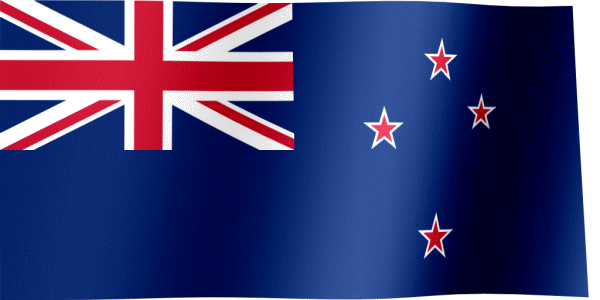

About New Zealand
New Zealand (land of the long white cloud), truly is one of the most picturesque and photogenic places on earth. New Zealand is an island country located in the Pacific Ocean. This country is made up of two major land masses (North Island and South Island) and a number of smaller islands including Stewart Island located in the southwestern Pacific Ocean. The closest countries to New Zealand are Australia and the Pacific island nations: Fiji, New Caledonia and Tonga.
The country is made up of some of the worlds most spectacular landscapes, from vast mountain ranges, steaming volcanoes to sweeping coastlines. New Zealander's are affectionately known as "Kiwis", no not the fruit ; The KIWI, is a flightless bird native to New Zealand. The general climate is mild and temperate however areas in the far north experience warm subtropical temperatures, while the far south is much cooler. Alpine conditions ensue in mountainous areas.
Capital: Wellington
Currency: New Zealand dollar (NZ$)
Language: English, Māori
Population: 5,084 million

Why Study in New Zealand
New Zealand is emerging as one of the topmost preferences among students wanting to study abroad. With an excellent education system, internationally accredited qualifications, ample research opportunities and a matchless quality of life, New Zealand has a lot to offer. New Zealand has several types of higher education institutions: universities, colleges, private institutions and polytechnics. Students are encouraged to think as an individual and find their own solutions, which is how many develop unique strengths and ideas whilst studying in the country. Below are some of the benefits to consider for studying in New Zealand.
Map of New Zealand

Benefits of studying in New Zealand
Innovation and research
New Zealand provides abundant opportunities in research for students. The country boasts of highly experienced faculty, well-equipped laboratories, access to latest technology, equipments, and opportunities.
Globally recognised qualifications
All eight universities of New Zealand consistently rank high in QS World Rankings* and Times Higher Education Rankings, and qualifications from any of these are accredited across the globe, opening doors to prospects everywhere. The New Zealand Qualifications Authority (NZQA) also ensures that institutions are registered to enrol international students and comply with qualifications standards.
Excellent pedagogy
Influenced by the UK education system, New Zealand focuses on research-based teaching, which means you will learn dealing with situations in a systematic and an organised manner. You’ll be taught how to work independently as well as in a team at various levels. Studying here will encourage you to think critically, question and benefit from student-teacher interaction. You’ll also be implementing the concepts learnt in the classroom and develop different approaches towards solving a problem.
Great scope for PhD scholars
Along with the vast research opportunities, as a PhD student you would enjoy additional privileges. You’ll be eligible to pay the same tuition fee as locals and unlike other degree students, you can work full-time during your studies.
Safe and peaceful
On the Global Peace Index 2018, New Zealand ranks second, which speaks about the social tolerance and political stability of the Kiwi democracy. As an international student, you’ll have the same rights as your Kiwi counterparts.
Quality of life
New Zealand offers a wonderful multi-cultural environment that exists in perfect harmony with the country’s outdoorsy lifestyle. Replete with all kinds of natural landscapes ranging from snowcapped mountains and steaming volcanoes to rolling green hills, golden sandy beaches and lush rainforests, New Zealand screams wanderlust. Living here provides every student a chance to grow with its diverse culture and natural beauty all at once.
You can work to support your studies
In New Zealand, an international student can work for up to 20 hours every week during your semesters and full-time during breaks. In fact, if you’re pursuing research masters or a doctoral degree, you will be allowed to work full-time.
Top Universities in New Zealand
According to QS World University Ranking 2022, here are the top universities in New Zealand: -
New Zealand Rank | Name of the University | Global Rank |
|---|---|---|
1 | The University of Auckland | 85 |
2 | University of Otago | 194 |
3 | Victoria University of Wellington | 236 |
4 | University of Canterbury | 258 |
5 | Massey University | 284 |
6 | Lincoln University | 372 |
7 | University of Waikato | 373 |
8 | Auckland University of Technology (AUT) | 451 |
Essential guidelines for Students to study in New Zealand
Work while you study
New Zealand student visas usually allow full-time students to work up to 20 hours a week during the academic year and up to 40 hours a week during the summer break. This applies to both secondary school and tertiary students. Research master's and PhD students can work 40 hours a week all year round.
Main Intake
The academic year in New Zealand corresponds to the calendar year starting in late February or early March and ending in October. Some universities may offer summer school courses and the possibility to start your university studies in July.
English Language
To successfully obtain a New Zealand study visa, you need a minimum overall IELTS Band Score of 5.5.
Post Study Work Visa
If you have acceptable qualifications(s) that you completed in New Zealand, you can apply for a visa to work here. Depending on your qualification and where you studied, you can work for any employer for between 1 and 3 years, and do almost any work.